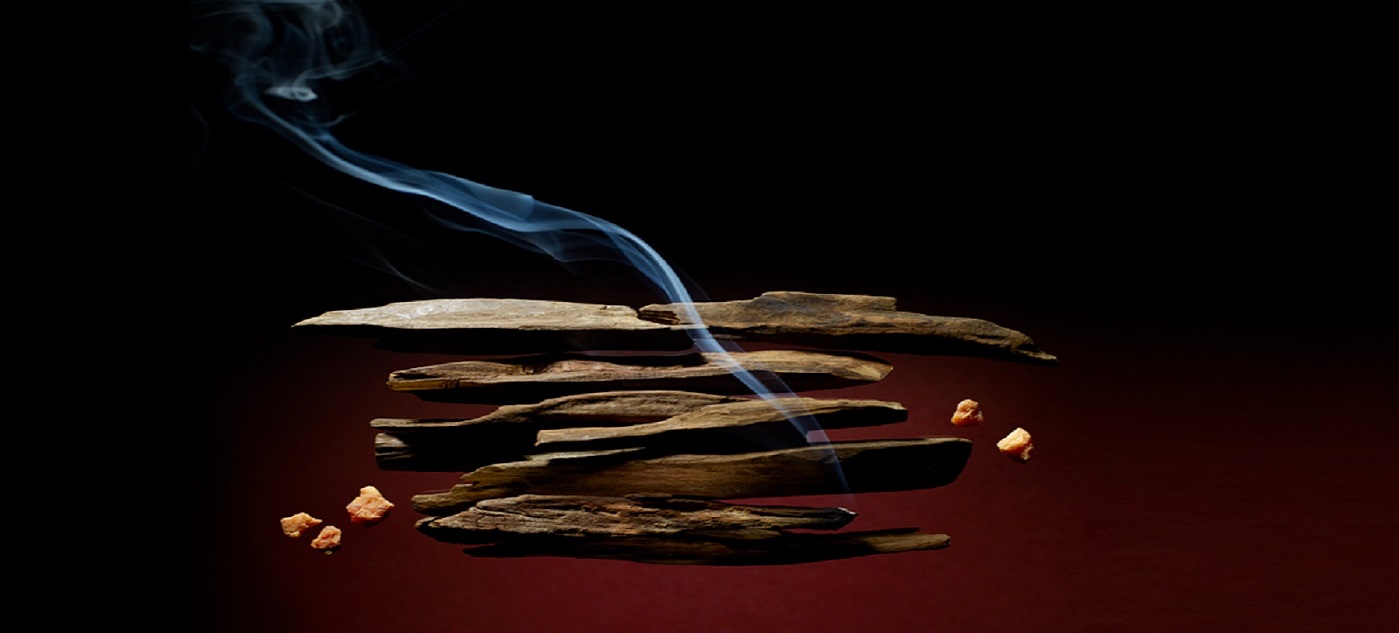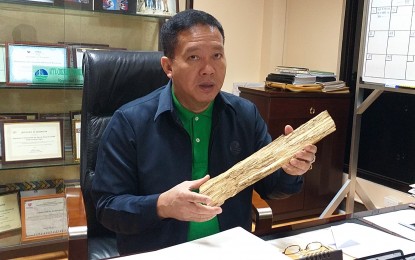
Due to over-harvesting of entire forests as well as the incredibly labor intensive process of artisan distillation, 2012 retail prices around the globe have increased significantly and are generally US$8,000-US$32,000 and up for a kilogram of Aloeswood chips and anywhere from US$8,000-US$61,000 for a single litre of pure Aloeswood Oil. Difficult to believe, but it happens every day on the world markets.
The Aquilaria species is native to India, Thailand, Vietnam, China, Cambodia, Borneo, Laos, Pakistan, Indonesia, Burma, New Guinea, Malaysia, and Philippines.
The Oudh we source is artisanally distilled in Assam from Aquilaria Agallocha. Since ancient times, Assam was the richest area of natural occurring Agarwood trees. There are 15 species of Aquilaria in the world but only 8 produce resin in response to a fungal attack.
This ‘Wood and Oil of the Gods’ is also called: oudh, oud, aoud, ud, agar, aloes, agarwood, aloeswood, gaharu, kyara, eaglewood, bois d’aigle, kinam, telugu, aguru, agaru, jinkoh, chien-xiang, tram huong, cham heong, sasi, sashi, akil, mai kritsana and mai ketsana.
Then there is the tale of a wealthy Japanese businessman who is said to have purchased two exquisite pieces of Aloeswood suitable for sculpture and paid the equivalent of US$100,000 for one of the pieces and US$272,000 for the other. Can this be true?
The aroma of Oudh is deeply spiritual in nature and connects us with our ancient past. Oudh is used around the world for religious occasions by Muslim, Hindu, Buddhist, Sufi, Shinto and Japanese Shamanic as well as others.
It is written in the Qur’an that Aloeswood contains 7 cures, and it is known to be the Biblical ahaloth [aloes] of King Solomon in the Old Testament ‘Song of Solomon’ written more than 30 centuries ago. There are many who believe a cutting of the Aloeswood tree was taken by Adam from the Garden of Eden. The facts will forever remain a great mystery of history.
Oudh was used by the Prophet of Islam [peace be upon him], and he praised it as one of the three most beloved things the worldly life had to offer.
Oudh was praised by the Buddha as being ‘the scent of Nirvana’ and is mentioned in the third century Chinese chronicle Nan Zhou Yi Wu Zhi.
It is known that the Japanese Samurai warriors scented their armor with Agarwood smoke for protection before going into battle and King Louis XIV of France had his shirts washed only in water that had previously been used to boil Agarwood.
The People of the Gulf States are said to always seek the absolute best quality Oudh aroma profiles but are not always so highly concerned whether it’s natural or synthetic in purity, although alcohol is totally forbidden by religion. Traditionally, culturally and religiously, both the oil and the wood have been revered for many centuries. Used in Holy ceremonies and still considered Holy in this modern day.
Our Oudh is always 100% pure and natural and is appropriate and acceptable for use in religious purposes and holy occasions.
In the New Testament of the Christian Bible it is written that Aloes and Myrrh of ‘one hundred weight’ were brought to Nicodemus to be used in the tomb to anoint the body of the Christian Savior Jesus Christ,, and a legend says that Aloeswood was burned at the funeral of Jesus.
From the 5000 year old Sanskrit Bhagavata Purana:
‘The men and women of the city, arrayed in spotless raiment and anointed with fragrant sandalwood paste, wore precious necklaces, flower garlands and jeweled ornaments, and their opulent homes were filled with the aroma of Aguru.’
Given the significance of this exalted substance in the world religious and cultural traditions, the history of this substance speaks volumes before you ever smell it. For millennia, people have felt a deep spiritual attraction to Oudh and realize they must acquire some.
Although there are a number of high-end Western perfumes and colognes available today with ‘Oudh’ in their name, most of them contain very little true Aloeswood/Agarwood oil. In others, the Oudh contained is synthetic, and some are Oudh in name only, containing no Aloeswood/Agarwood oil at all, either natural or synthetic. Among others, the world famous luxury fragrances Zeenat and Amouage do indeed contain the precious Aloeswood/Agarwood oil.
Oudh is an somewhat of an acquired taste. It’s aroma is virtually unknown to the Western nose but the Eastern nose is well educated.
In modern times, the Ayurvedic, Tibetan, Arabic, Unani and Traditional Chinese Medical practices use Aloeswood oil and Aloeswood in various ways such as for certain medical remedies and even to treat particular diseases. It is used as a light sedative to calm the mind and spirit, relax the nervous system, relieve emotional anxieties and mental illness and invoke a sense of peace, strength and serenity, enhance cerebral functioning, purify the liver and balance the organs, treat insomnia, digestive ailments and abdominal problems,, certain obsessive behaviors, relieve pain, sore throat, vomiting, increase alertness, expel negative energies and open the upper chakras.
In addition to the warming qualities and medical properties of Agarwood/Aloeswood, it is also known as an aphrodisiac and is still used today in various gourmet culinary preparations.
To the uninitiated nose, Oudh can sometimes overwhelm the senses but those potent initial notes are only the 1st movement of a concerto of ancient aroma profiles that resonate in a pure Oudh. We’re quite pleased with the potency, tenacity and aroma profiles of both of our currently available Assam oils [1A and AA].
In wearing a “deep dark resonating oudh with a nice bit of barnyardy at first swipe” such as the Assam Oudhs [which I personally favor] only a tiny amount is used at a time, unless you’re making a bold statement [which we also favor].
Expect the aroma profile of the Hindi Assam Oudh to last for 8-12 hours on skin, depending on physical activity and body chemistry of the person wearing it, and generally lasting for 15+ days on cloth.
Oudh is worn worldwide by men and women alike. It is one of the true natural wonders given to mankind and should be experienced by the connoisseur, the person of Spirituality, and all who are serious about Aromatherapy.



